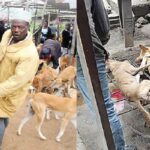
Justice Binta Nyako of the Federal High Court, Abuja, on Friday, struck out eight out of the 15 counts preferred against the detained leader of the Indigenous People of Biafra, Nnamdi Kanu.
Justice Nyako freed Nnamdi Kanu on the eight counts, while ruling on a preliminary objection filed by the IPOB leader challenging the validity of the 15 amended charges preferred against him by the Federal Government.
Justice Nyako ruled, “In this instant preliminary objection application, I have read the counts and come to the conclusion that counts 6, 7, 8, 9, 10, 11, 12 and 14 have not disclosed any offence against the defendant.
“Counts 1, 2, 3, 4, 5, 8 and 15 show some allegations, which the defendant has to answer. The court shall proceed to try the defendant on those counts.”
The court also slated May 18 and 26 to rule on an application filed by Kanu seeking to be released on bail pending the determination of the treasonable felony charge the Federal Government preferred against him.
Justice Nyako adjourned to the date to rule on the application after she heard arguments from Kanu’s lawyer, Mike Ozekhome (SAN), and the prosecution counsel, Shuaibu Labaran.
Ozekhome, in his argument, stated that his client was entitled to bail considering that he still enjoyed the presumption of innocence under the 1999 Constitution as amended.
Labaran, however, urged the court to decline the bail request, maintaining that Kanu had betrayed the previous discretion the court exercised in his favour when he jumped bail and escaped from the country.
He argued that it was due to Kanu’s previous conduct that the court revoked his bail and issued a bench warrant for his arrest.
Labaran submitted, “My lord granted him bail in 2017 on health grounds, but no medical record was submitted to the court until he jumped bail.
“What we should be saying is contempt of court, because he has flagrantly violated the orders of this court.”
Ozekhome, however, faulted the Federal Government’s lawyer for alleging that his client jumped bail.
He told the court that Kanu attended his trial regularly until the military, in September 2017, invaded his home in an operation that led to loss of lives.
Ozekhome insisted that it was the action of the Nigerian Army that made his client run for his life.
Besides, he argued that the government violated the fundamental rights of his client in the way he was forcefully abducted and extraordinarily extradited to Nigeria.
He, therefore, urged the court to grant Kanu bail to enable him to effectively prepare his defence on the charges pending against him.
Justice Nyako dismissed Ozekhome’s contention that Kanu’s extraordinary rendition was illegal.
She stressed that there was a subsisting warrant from the court for the arrest of the defendant wherever he was found.
Meanwhile, Kanu’s resumed trial, on Friday, brought activities to a halt in Imo State as markets, shops, schools, banks and filling stations all closed for business.
This was in compliance with the sit-at-home ordered by IPOB as all the 27 local government council headquarters were deserted by workers.
In Owerri, the state capital, roads/streets and the usually boisterous highbrow Ikenegbu, Aladinma, Works Layout, Prefab, World Bank and the Area ‘H’ were all deserted.
The few okada riders, who operated on some of the roads, capitalised on the situation to hike fares.
One of our correspondents, who monitored the situation, sighted armed riot policemen in their vehicles at strategic junctions, adjacent to the Government House roundabout, Bank Road and the Nigerian Correctional Centre patrolling the empty roads.
As of the time of filing this report, most motor parks in Owerri had been converted to football fields by youths who freely played balls in them.
Frustrated residents of the city, especially those on essential services, were seen trekking long distances to get to their destinations.
In a related development, commercial activities were brought to a halt on Friday in Umuahia, the Abia State capital, following the hearing of the case involving Kanu.
Saturday PUNCH monitored the development and observed that banks and other corporate firms did not open for transaction.
Street traders, including food vendors, also stayed away from their shops.
The trend was not different in Aba, the commercial hub of the state where major markets did not open for commercial activities.
A trader who spoke to our correspondent on the phone said, “I didn’t leave my house today because the market didn’t open. Kanu went to court today.”
Copyright PUNCH.
All rights reserved. This material, and other digital content on this website, may not be reproduced, published, broadcast, rewritten or redistributed in whole or in part without prior express written permission from PUNCH.
Contact: [email protected]





